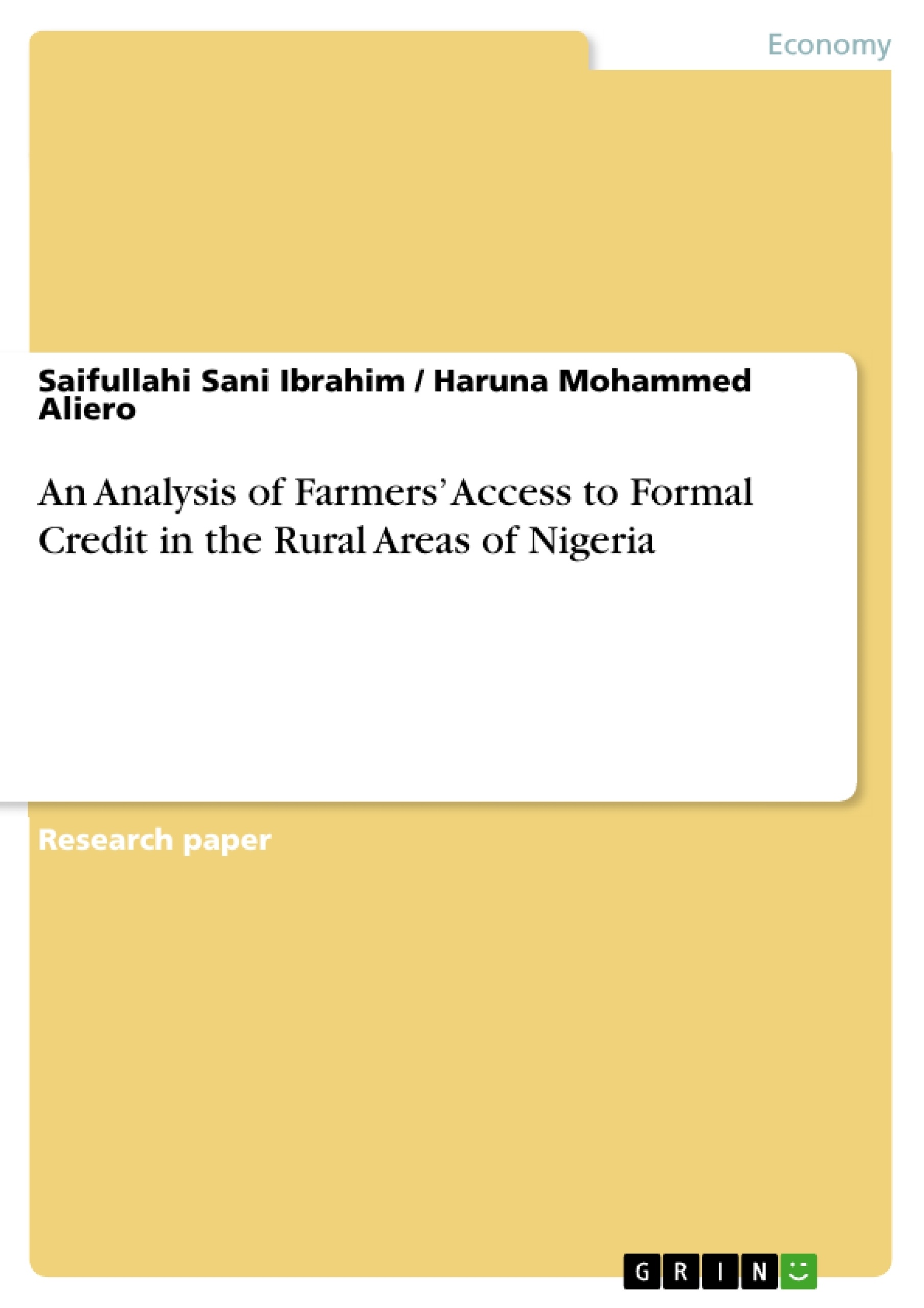Excerpt
An Analysis of Farmers’ Access to Formal Credit in the Rural Areas of Nigeria
Abstract
This study examines the factors that influence Farmers access to formal banking credit in the rural areas of Nigeria. The data used was collected from rural areas of Katsina State. The study used probit modelling approach to analyse the factors that influence farmers’ accessibility to formal credit. The study found that the level of income, collateral, educational attainment and marital status have significant positive influence on farmers’ access to formal credit, while age and sex have insignificant positive influence on the farmers’ access to credit. On the other hand, interest rate and transaction cost have significant negative influence on the farmers’ access to formal credit. Thus, the paper concluded that with the prevailing banking arrangement in Nigeria, rural farmers have little or no access to credit from conventional banks. Therefore, the study recommended the use of both group lending arrangement and character lending, so that farmers in the rural areas could be reached with formal credit.
Key words: Rural farmers’ access to credit, rural finance, Agricultural financing determinants.
1. Introduction
In Nigeria several programmes were implemented to support agricultural sector; such as Rural Banking, Agricultural Credit Guarantee Scheme (ACGSF), aimed at enhancing availability of credit to rural populace especially farmers at affordable cost. However, the programmes have at one time or the other been influenced by political considerations; hence they recorded little success (Aliero, 2009). In fact the usufruct of the programmes does not reach the targeted beneficiaries. Some of the problems identified as responsible for poor performance in the development of Africa’s rural financial markets include excessive controls, ineffective supervision and dearth of qualified manpower (World Bank, 1999). Rural farmers often have to plough back their profit (if any) or rely on informal village money lenders to source finance which in turn be used to pay for the services of the productive factors employed in the course of farming activities. Farming is virtually subsistence in nature in rural Nigeria, perhaps, commercial agriculture was largely absent in the areas, this is partly because most people dwelling in rural areas are poor, characterized by low income, large family size, lack of adequate formal education, low savings and investment, lack of access to credit facilities and use of crude farm implements. As a result, poor economic base, untold hardship, living from hand to mouth, joblessness, high death rate, etc have characterised the life in rural areas (Olayide et al., 1980) .
About two-third of Nigerians are said to be poor and 80% of whom are living in rural areas, they pathetically feel dissatisfied with their present living conditions (Badayi, 2002) and over 80% of the total agricultural produce was derived from subsistence farming activities of this area, at the same time, rural farmers are not paid enough for their produce, whereas price for basic farming tools and other essential inputs are constantly rising beyond their reach (Babasanya et al., 2008). The low income level of rural farmers stem from global instability of the demand for agricultural output as well as the rising costs of agricultural input compelling rural farmers to operate purely on subsistence level with low investment as a result of low productivity and low income (Beck, Levine and Loayza, . 2000). It has been argued by IPAR (2007) that lack of market information and therefore, inadequate access to finance by the rural poor in developing countries, is one of the main reasons why people remain poor. It is in this regard that Burgess and Pande (2003) have argued that access to finance is critical to enable the poor to transform their production systems and thus exit poverty. Access to finance through credit assists the poor not only to smooth their consumption but also to build their assets, which enhance their productive capacity (IPAR, 2007).
The main objective of this paper is to analyse the factors that influence accessibility of formal credit by the rural farmers. To achieve this objective, the rest of the paper is structured into four sections. Second section contains literature review, while section three is the methodology, section four presents the results and discussion and the last section concludes the paper.
2. Review of Related Literature
Credit markets in rural areas are often constrained by inadequate property rights and high transaction costs. Despite these problems, some small-scale farmers have managed to produce food for own consumption and the market (Ortmann and King, 2006). Credit is an important instrument for improving the welfare of the poor directly through consumption smoothening that reduces their vulnerability to short-term income. It also enhances productive capacity of the poor through financing investment in their human and physical capital (Okurut et al., 2004). Access to credit is regarded as one of the key elements in raising agricultural productivity (DBSA, 2005).
- Quote paper
- Saifullahi Sani Ibrahim (Author)Haruna Mohammed Aliero (Author), 2011, An Analysis of Farmers’ Access to Formal Credit in the Rural Areas of Nigeria, Munich, GRIN Verlag, https://www.grin.com/document/177683
Publish now - it's free






















Comments